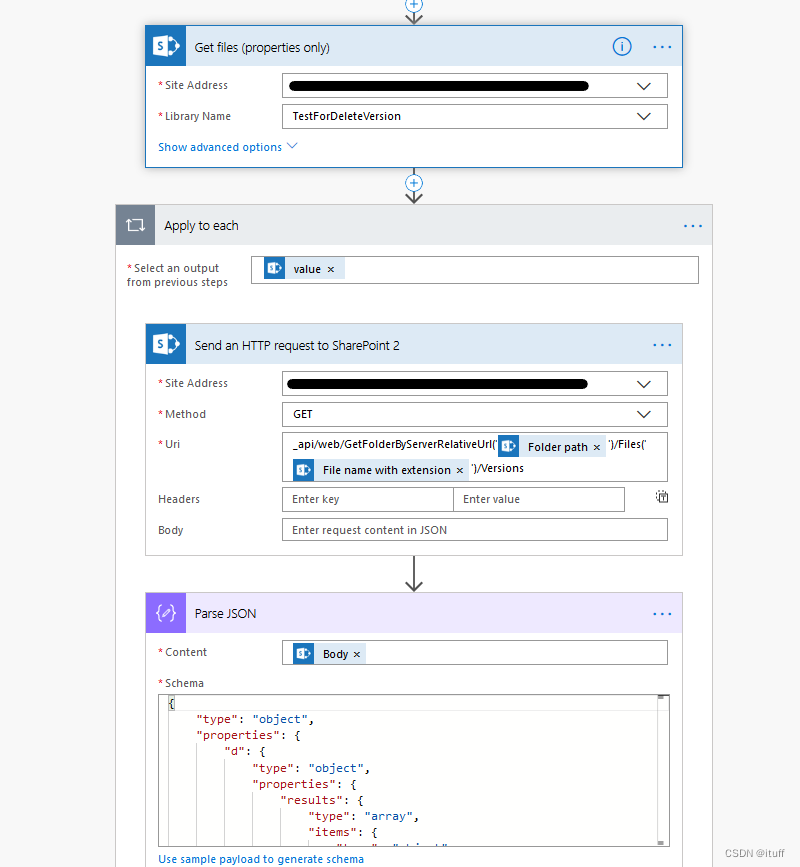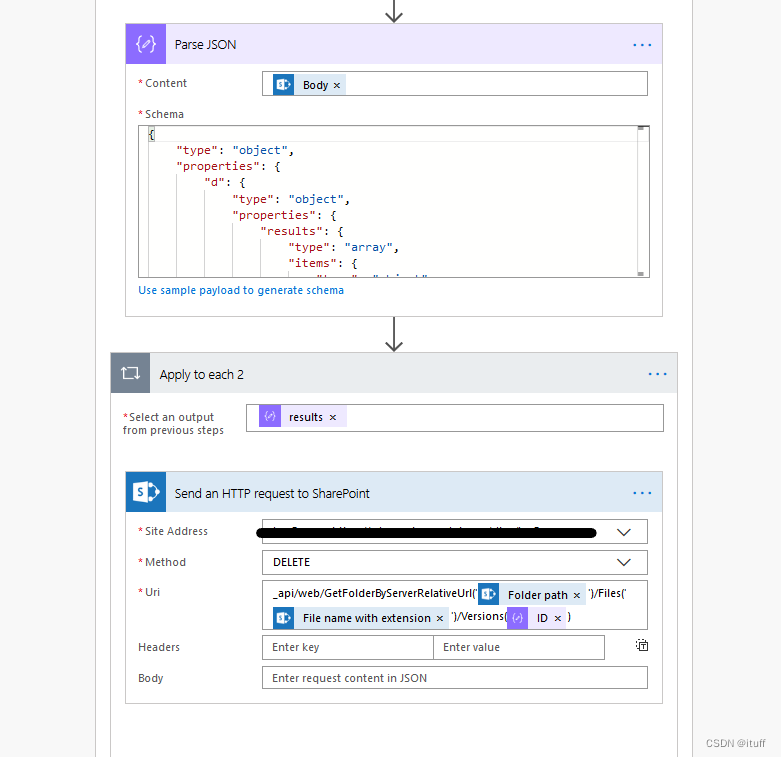Power Automate删除SharePoint Online或OneDrive for Business文件版本历史
发布时间:2024年01月03日
SharePoint Online和OneDrive for Business支持版本控制,可以保留文件的版本历史,方便用户随时查看和恢复以前的版本。但该功能也会占用大量SharePoint Online或OneDrive for Business存储空间。官方删除版本历史的方法无法批量操作,故今天提供一种使用Power Automate来删除SharePoint Online或OneDrive for Business文件版本历史。
第一步:添加“Get files(properties only)”操作,以获取列表中的文件。
第二步:添加“Send an HTTP request to SharePoint”操作:
Method: GET
Uri: _api/web/GetFolderByServerRelativeUrl('Dynamic content of Folder Path')/Files('Dynamic content of File name with extension')/Versions
第三步:“Parse JSON”,将上一个动作的正文放入解析 JSON 动作的内容中,然后点击“使用示例负载”按钮生成 schema 粘贴如下 schema:
{
??? "type": "object",
??? "properties": {
??????? "d": {
??????????? "type": "object",
??????????? "properties": {
??????????????? "results": {
??????????????????? "type": "array",
??????????????????? "items": {
??????????????????????? "type": "object",
??????????????????????? "properties": {
??????????????????????????? "__metadata": {
??????????????????????????????? "type": "object",
??????????????????????????????? "properties": {
??????????????????????????????????? "id": {
??????????????????????????????????????? "type": "string"
??????????????????????????????????? },
??????????????????????????????????? "uri": {
??????????????????????????????????????? "type": "string"
??????????????????????????????????? },
??????????????????????????????????? "type": {
??????????????????????????????????????? "type": "string"
??????????????????????????????????? }
??????????????????????????????? }
??????????????????????????? },
??????????????????????????? "CreatedBy": {
??????????????????????????????? "type": "object",
??????????????????????????????? "properties": {
??????????????????????????????????? "__deferred": {
??????????????????????????????????????? "type": "object",
??????????????????????????????????????? "properties": {
??????????????????????????????????????????? "uri": {
??????????????????????????????????????????????? "type": "string"
??????????????????????????????????????????? }
??????????????????????????????????????? }
??????????????????????????????????? }
??????????????????????????????? }
??????????????????????????? },
??????????????????????????? "CheckInComment": {
??????????????????????????????? "type": "string"
??????????????????????????? },
??????????????????????????? "Created": {
??????????????????????????????? "type": "string"
??????????????????????????? },
??????????????????????????? "ID": {
??????????????????????????????? "type": "integer"
??????????????????????????? },
??????????????????????????? "IsCurrentVersion": {
??????????????????????????????? "type": "boolean"
??????????????????????????? },
??????????????????????????? "Length": {
??????????????????????????????? "type": "string"
??????????????????????????? },
??????????????????????????? "Size": {
??????????????????????????????? "type": "integer"
??????????????????????????? },
??????????????????????????? "Url": {
??????????????????????????????? "type": "string"
??????????????????????????? },
??????????????????????????? "VersionLabel": {
??????????????????????????????? "type": "string"
??????????????????????????? }
??????????????????????? },
??????????????????????? "required": [
??????????????????????????? "__metadata",
??????????????????????????? "CreatedBy",
??????????????????????????? "CheckInComment",
??????????????????????????? "Created",
??????????????????????????? "ID",
??????????????????????????? "IsCurrentVersion",
??????????????????????????? "Length",
??????????????????????????? "Size",
??????????????????????????? "Url",
??????????????????????????? "VersionLabel"
??????????????????????? ]
??????????????????? }
??????????????? }
??????????? }
??????? }
??? }
}
第四步:创建另一个“Send an Http request to SharePoint”:
Method: DELETE
Uri: _api/web/GetFolderByServerRelativeUrl('Dynamic content of Folder Path')/Files('Dynamic content of File name with extension')/Versions(ID from the previous action)
文章来源:https://blog.csdn.net/ituff/article/details/135364984
本文来自互联网用户投稿,该文观点仅代表作者本人,不代表本站立场。本站仅提供信息存储空间服务,不拥有所有权,不承担相关法律责任。 如若内容造成侵权/违法违规/事实不符,请联系我的编程经验分享网邮箱:chenni525@qq.com进行投诉反馈,一经查实,立即删除!
本文来自互联网用户投稿,该文观点仅代表作者本人,不代表本站立场。本站仅提供信息存储空间服务,不拥有所有权,不承担相关法律责任。 如若内容造成侵权/违法违规/事实不符,请联系我的编程经验分享网邮箱:chenni525@qq.com进行投诉反馈,一经查实,立即删除!
最新文章
- Python教程
- 深入理解 MySQL 中的 HAVING 关键字和聚合函数
- Qt之QChar编码(1)
- MyBatis入门基础篇
- 用Python脚本实现FFmpeg批量转换
- 面试问题记录【深圳,共三面,A 轮公司】
- YHZ018 Python 运算符优先级
- 关于大一上学期STM32培训的经验及教训(完全初学)
- 领域驱动设计(Domain-Driven Design DDD)——模型驱动设计的构造块1
- 软件测试之自动化测试的四个阶段
- 如何解决redis热点key问题
- 【AIGC】IP-Adapter:文本兼容图像提示适配器,用于文本到图像扩散模型
- 基于SSM的网上球鞋竞拍系统
- 100天精通风控建模(原理+Python实现)——第13天:风控建模中的方差分析是什么?怎么实现?
- 关于CPU核心数的统计总结